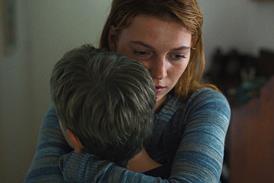Dir: Eytan Fox. Is. 2006. 90mins.
Film-maker Eytan Foxdisappointingly follows Walk On Water, one of Israel's strongest exports of recenttimes, with The Bubble, asurprisingly feeble drama which picks up on similar themes but frames them indisorganised fashion.
Set in Tel Aviv's Shenkin neighbourhood, the Israeli capital's equivalent ofGreenwich Village, the drama addresses the self-styled bubble assembled by itstrendy young inhabitants to ignore the pain, strife and crises that beset therest of the nation.
Its four young protagonists- three gay men and a heterosexual woman - share a flat: conflict spirals outfrom the presence of one, a Palestinian with no residence permit to remain inTel Aviv. Eventually it all careers into innocent civilians being shot in anArab village by Israeli soldiers and suicide bombers attacking the heart of TelAviv.
Best hope for The Bubble beyond home - where it openedin late June - lies with gay markets and specialised festivals, despite thefact that its uncertain mix of sex and politics never progresses beyond theembryonic. Otherwise its chances seem soft, especially once word gets out aboutits blunt approach. Certainly, it is likely to fare less well than Walk On Water,which carried similar messages but was far more subtle in its delivery and paidmore attention to characterisation.
The film opens on a WestBank roadblock, the sort where the Israeli occupation forces humiliate the Arabpopulation (and captured far better in the likes of YoavShamir's RoadBlocks or Avi Mograbi'sVengeance Of OneEye). Noam (Knoller), anIsraeli army reservist, tries to help an Arab woman give birth to what willultimately - and symbolically - be a dead baby. As he raises his eyes, henotices Ashraf (Yousef Sweid); the handsome young Arab returns his glance andthere's an almost audible click.
Noam and Ashraf spend thefollowing night together at the soldier's flatshare. Nextmorning, Ashraf comes out of Noam'sroom to meet his lover's housemates, the flamboyant Yali(Friedman) and Lulu (Virtzer), who is deeply troubledat how none of the men she sleeps with will commit to a long-term relationship.
Yali and Lulu do not mind Noam'snew romance, but are worried that harbouring an illegal Palestinian mightdisrupt the harmony of their perfect bubble, forcing them to take stands onissues they usually ignore. At first the household tries to deal with the issuein its own way by hiding him - but then Ashraf has toreturn to his village, where he faces rejection from his beloved sister, whowon't stand for his homosexuality, and Jihad (Gabarin),
his fiercely macho future brother-in-law and leader of a guerillacell.
The screenplay bludgeons thecharacters into one preposterous situation after another and piles up the transparentmetaphors to an unbearable level for those who can discern them (Noam in Hebrew means 'pleasant'; his peace-lovingmother, featured in several flashbacks, is named after Sara, the mother of allJews).
Meanwhile the dialoguealmost feels as if it was adopted from a soap opera than a politicallymotivated picture. Ohad Knoller,who collected several awards for his performance in Fox's Yossi And Jagger,looks somewhat uncomfortable at times, while DaniellaVirtzer's character never really catches fire. Yousef Sweid's presence willmainly be noted for its courage and that rare example of an Arab actor portrayingan explicit gay sex scene with an Israeli.
Flat, unimaginative camerawork (from 16mm blown up to 35mm) helps little, although the soundtrack,peppered with modern hits, is a positive.
Production companies
Metro
Hot TV
Keshet TV Broadcasting
United King Films
International sales
Scalpel Films
Israeli distribution
United King Films
Producers
Amir Feingold
Gal Uchovsky
Ronen Bel-Tal
Screenplay
Gal Uchovsky
Eytan Fox
Cinematography
Yoram Scharf
Editor
Josef Greenfeld
Production design
Ido Dolev
Music
Ivry Lider
Main cast
Ohad Knoller
Alon Friedman
Daniella Virtzer
Yousef Sweid
Miki Kam
Lior Ashkenazi
Zion Baruch



















No comments yet